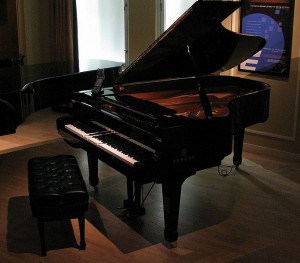The well-tempered MIDI
 THE GALA TORONTO CONCERT DEBUT of 13-year-old piano virtuoso Lucas Porter was a heady occasion to be sure, but the young Port Williams, Nova Scotia native was hardly in foreign territory. He wasn’t even in Toronto — not physically, at least. When he sat down at the keyboard to play the first notes in his performance, he was only a few kilometers from his Annapolis Valley home — in the music department at Acadia University. Porter’s hands danced across the keyboard in the standard way, but the sound the audience heard emanated from a piano located on a stage more than 1,000 kilometers away.
THE GALA TORONTO CONCERT DEBUT of 13-year-old piano virtuoso Lucas Porter was a heady occasion to be sure, but the young Port Williams, Nova Scotia native was hardly in foreign territory. He wasn’t even in Toronto — not physically, at least. When he sat down at the keyboard to play the first notes in his performance, he was only a few kilometers from his Annapolis Valley home — in the music department at Acadia University. Porter’s hands danced across the keyboard in the standard way, but the sound the audience heard emanated from a piano located on a stage more than 1,000 kilometers away.
The concert that Porter played that day was not designed to show off his considerable musical talents. It was staged to demonstrate a stunning piece of new technology called MusicPath. The MusicPath software allows a musician to play a MIDI-equipped piano in one location, then transmit the signal via Internet connection to a second instrument that can be located anywhere in the world. It uses musical instrument digital interface (MIDI), the same technology that does everything from controlling rides at major theme parks and events at Las Vegas casinos to generating ring tones in mobile phones.
At Acadia, an acoustic piano fitted with MIDI serves as the controller, with MusicPath sending the signals via a high-speed Internet connection to a similar piano located elsewhere in the world. A video conference link allows teacher and student to talk and see each other as the lesson progresses. The system is so fast that musicians have even played piano duets that were written for a single keyboard, with one pianist sitting at a keyboard in Nova Scotia and the other in British Columbia. “What this does in effect is put the instructor and the student in the same chair,” says system co-designer Christoph Both.
Like most new technologies, MusicPath will have applications that its creators never envisaged when they started the development process. Both sees a day when virtuoso pianists like Yefim Bronfman or stars like Elton John might give intimate concerts in thousands of fans’ living rooms simultaneously, using MusicPath software and desktop video conferencing technology. MusicPath would also allow musicians located in different parts of the world to record or rehearse together in real time. But the software’s true killer application is in the way it will change the way music lessons are conducted.
The technology gives advanced students like Porter a chance to study with world-renowned teachers. Students who live in remote locations where music teachers are scarce can also use MusicPath. And soon, high-level piano players may not have to travel to places like Toronto to take advanced examinations. Porter is currently studying with Marc Durand, a well-known Royal Conservatory teacher based in Toronto. With MusicPath, Duran can interpret the nuances of Porter’s performance and suggest small tweaks and revisions. “You could never have this level of control just by using microphones and video conferencing hook-ups,” says Acadia’s Jim Diamond, who wrote the MusicPath code. “You need the live piano.”
Tom Mason
